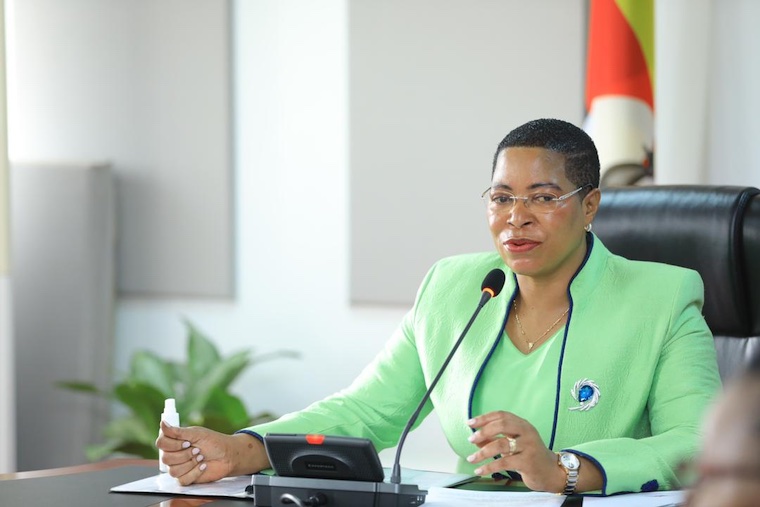
In Bukedea, her home district in eastern Uganda, Speaker Anita Annet Among is greeted like royalty.
The crowd parts as she steps out of a black convoy, the air filled with songs praising “Mama Speaker.” To her supporters, she is the woman who brings solutions where the government has stalled; the Speaker who builds hospitals, mediates teacher strikes, and hands out scholarships with the same confidence she wields the gavel in Parliament.
In a political system long dominated by President Yoweri Museveni, Among has carved out a power base of her own, one that extends far beyond the walls of Parliament. Her rise has been meteoric, her methods polarizing, and her influence, even by Uganda’s standards, unprecedented.
When Among first entered Parliament as a backbencher, few imagined she would one day hold one of the most powerful offices in the country. Her political ascent accelerated after the death of Speaker Jacob Oulanyah in 2022, when she inherited a deeply divided House and a public weary of political scandal.
Since then, she has transformed the Speakership into something far more potent, and far more political, than ever before. On whirlwind tours across Uganda, Among has projected herself as both problem-solver and patron.
She has mediated industrial disputes, delivered development projects, and in a bold display of political strategy, convinced opposition figures like Bugweri member of parliament Abdu Katuntu and Bardege-Layibi Division MP Martin Ojara Mapenduzi to cross into the ruling NRM camp.
“This is a people-centred Parliament that handles every grievance from across the country to the satisfaction of citizens,” she declared after brokering peace with striking teachers and local government workers.
To many Ugandans, she has become the face of action in a government often criticized for inertia.
“Parliament was the ideal door to knock on for a quick and tangible response,” said Hassan Lwabayi Mudiba, Secretary-General of the Uganda Local Government Workers’ Union. Political analysts say Among has redefined what it means to be Speaker in Uganda.
“She has converted the office into a national political platform,” said Turyafuna Derrick, a lawyer and governance analyst.
“Unlike her predecessors who confined their roles to parliamentary procedure, she resolves disputes, delivers services, and engineers defections. The Speakership is now a tool of political mobilization.”
That mobilization has been aided by resources. Under Among’s leadership, the parliamentary budget has reportedly tripled, giving her vast discretionary control.
“Money in Uganda’s politics isn’t just administrative; it’s leverage,” Turyafuna added. Her concurrent position as NRM’s second national vice chairperson women, replacing Rebecca Kadaga, has placed her squarely in the ruling party’s top hierarchy.
Her growing influence, often encroaching on roles traditionally held by the Prime Minister or ministers, has triggered quiet unease among some within the government. “By resolving issues the Executive has struggled with, she’s earning trust beyond her office,” observed Timothy Msobor Chemonges of the Centre for Policy Analysis (CEPA).
“But her independence will depend on how she navigates Museveni’s political system, one that empowers and restrains in equal measure.”
Among’s populism is underpinned by grand gestures that blend charity with political capital. She recently announced a $4.3 million (Shs 15 billion) cancer patients’ home inside Mulago Hospital through her Friends of Annet Anita Among Foundation.
The facility aims to shelter patients who often sleep on hospital verandas for months as they await treatment. In Bukedea, she has built a teaching hospital and a comprehensive school. Her lavish gifts, including a Range Rover Vogue for her husband, Moses Magogo, on his birthday, have further burnished her image as wealthy and benevolent.
President Museveni himself has praised her development projects, even as whispers persist over how they are funded. “Her philanthropy,” said one NRM insider, “has turned her into a parallel centre of power.”
THE SHADOWS BEHIND THE SHINE
But Among’s rise has not been without controversy. In April 2024, the United Kingdom sanctioned her under its Global Anti-Corruption Regime, citing her alleged role in the diversion of iron sheets meant for poor communities in Karamoja.
The United States followed in May, accusing her of “significant corruption.” Among denies wrongdoing, calling the sanctions “politically motivated retaliation” for her support of Uganda’s Anti-LGBTQ law, a position that drew sharp criticism abroad but boosted her standing among conservative Ugandans.
At home, her leadership style has faced scrutiny. Courts overturned her decision to suspend MP Francis Zaake, and critics have accused her of shielding corruption scandals within Parliament.
Her comment that “corruption is like a child who eats and brings home” was condemned by the Uganda Law Society for normalizing graft. Online, the Uganda Parliament Exhibition campaign exposed alleged misuse of funds and extravagance in the legislature under her watch.
Yet through it all, Museveni has publicly defended her, describing her detractors as “traitors working for foreigners.” Among’s position today is both formidable and fragile. She commands institutional authority as Speaker and political legitimacy through her outreach and philanthropy.
Yet, she operates in a system that has historically punished those who rise too high. Figures like Gilbert Bukenya, Amama Mbabazi, and Rebecca Kadaga once appeared indispensable, until they weren’t.
“The question,” says analyst Turyafuna Derrick, “is whether Among’s ascent is sanctioned or self-engineered, and how long the system will tolerate her autonomy.”
Her supporters see her as Museveni’s protégé and perhaps his chosen bridge to the future. Her critics see a populist consolidating power through patronage and personal branding. Both may be right.
Among’s story reflects the paradox of Uganda’s political system: one where power appears decentralized but remains carefully managed from the top. Her prominence illustrates both the resilience and limits of ambition within Museveni’s Uganda.
She has, for now, mastered the art of visibility, standing out without appearing defiant. But the forces that elevated her can just as easily turn against her. Whether she becomes a lasting political powerhouse or another loyalist tamed by the state remains uncertain.
What’s clear is that Anita Among has changed the rhythm of power in Kampala, and for the first time in years, the gavel in Parliament echoes almost as loudly as the voice from State House.



